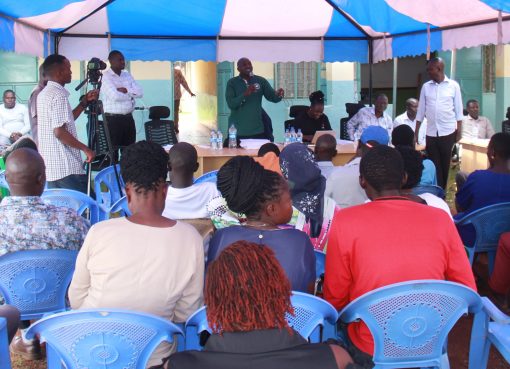The Kazi Mtaani Programme in Murang’a County has embarked on implementation of projects which will have a far reaching impact to the locals.
The National Hygiene Programme dubbed Kazi Mtaani has come as a great reprieve to youths and over 280,000 families across the country and in the past several months, the initiative has greatly improved on hygiene in many towns within the Murang’a County.
The initiative, that was started by the government to cushion youth from impacts of covid-19, has also seen an amazing facelift to informal settlements and major towns across the county which were previously littered with dirt besides blocked drainage systems and impassable foot paths.
Speaking to KNA at Mjini, one of the largest informal settlements within the Township Ward, where tree planting and digging of pit latrines was ongoing, Kiharu Division Assistant County Commissioner Ms Priscilla M Kiluti observed that the program has now diversified to legacy projects.
“Apart from clearing bushes, we are planting trees that will remain for long after the initiative has ended. This will have a lasting effect on the environment as well,” she said.
She said in Murang’a County, the programme has provided job opportunities to over 3,000 young people thus empowering them economically.
“In Murang’a East we have divided them into two groups each with 645 members. They are mostly from Mjini and Kayole areas which are informal settlements with the highest numbers of unemployed youth. The cohorts have nurtured a tree nursery with over 2,500 tree seedlings at Mumbi Girls High School, Kongoini area and at the chief’s office in township ward. They are currently transplanting these seedlings with the ongoing rains,” observed the administrator.
“Now that we are having adequate rainfall, the youth have transplanted the trees in various locations in Murang’a including Mumbi Girls High School, the compound at KWS offices and the county commissioner’s residence,” the ACC noted.
She added that they are currently digging pit latrines for the most vulnerable families within Mjini area where they are as well reconstructing some houses to make them habitable.
The ACC also observed that many of the recruits have different skills that have come in handy for the success of the Kazi Mtaani initiative. “We encourage them to use their skills and we provide needed materials. Some are skilled as carpenters, others in soap making while others are qualified landscapers. We are exploiting all these skill in the programme,” she added.
Kiluta noted that the government currently plans to provide materials for the youth to make soap that will be distributed to vulnerable families as well as schools to combat the spread of Covid-19. She added that the cohorts will also be making masks.
“Earlier the Kazi Mtaani project saw a major facelift in the schools around. We harnessed fences, cleared bushes and repaired classroom doors in some schools including Mjini, Mbiri, and Vidhu Ramji primary schools. The youth in Kazi Mtaani are grateful to the government for the program and thus have come up with initiatives to give back to the society,” she said.
The ACC disclosed that since the initiative began crime rate has significantly reduced. “The youth are now actively engaged so crime and insecurity cases especially in the informal settlement area of Mjini have greatly reduced.”
The Programme Coordinator Lennox Njoroge noted that the initiative has been of great reprieve to him too as he is able to meet the daily needs as well as harness his leadership skills.
“I graduated with a degree in Industrial Chemistry from Kimathi University. After searching for a job unsuccessfully and with the effects of Covid-19, life was challenging. Thanks to this initiative, I and thousands of other youth have been cushioned from the pangs of joblessness and Covid-19,” he affirmed and appealed to the government to further extend the duration of the programme.
The kazi mtaani initiative is being implemented in 900 settlements across the country with the main objective being to improve and maintain sanitation in informal settlements as well as economically cushion thousands of youth rendered jobless by coronavirus pandemic.
By Purity Mugo and Florence Kinyua




